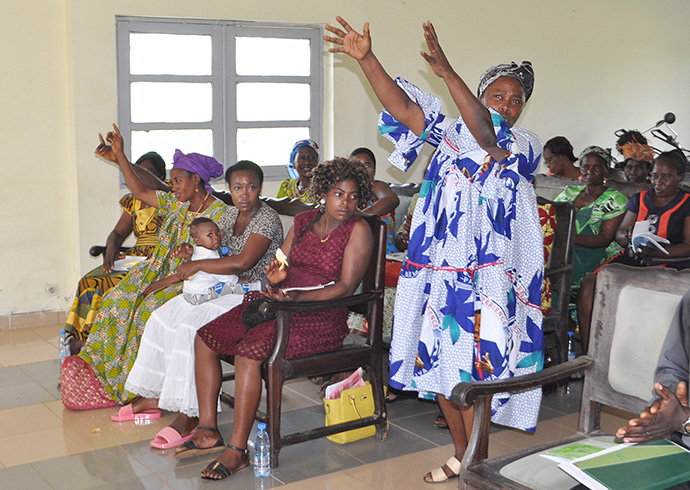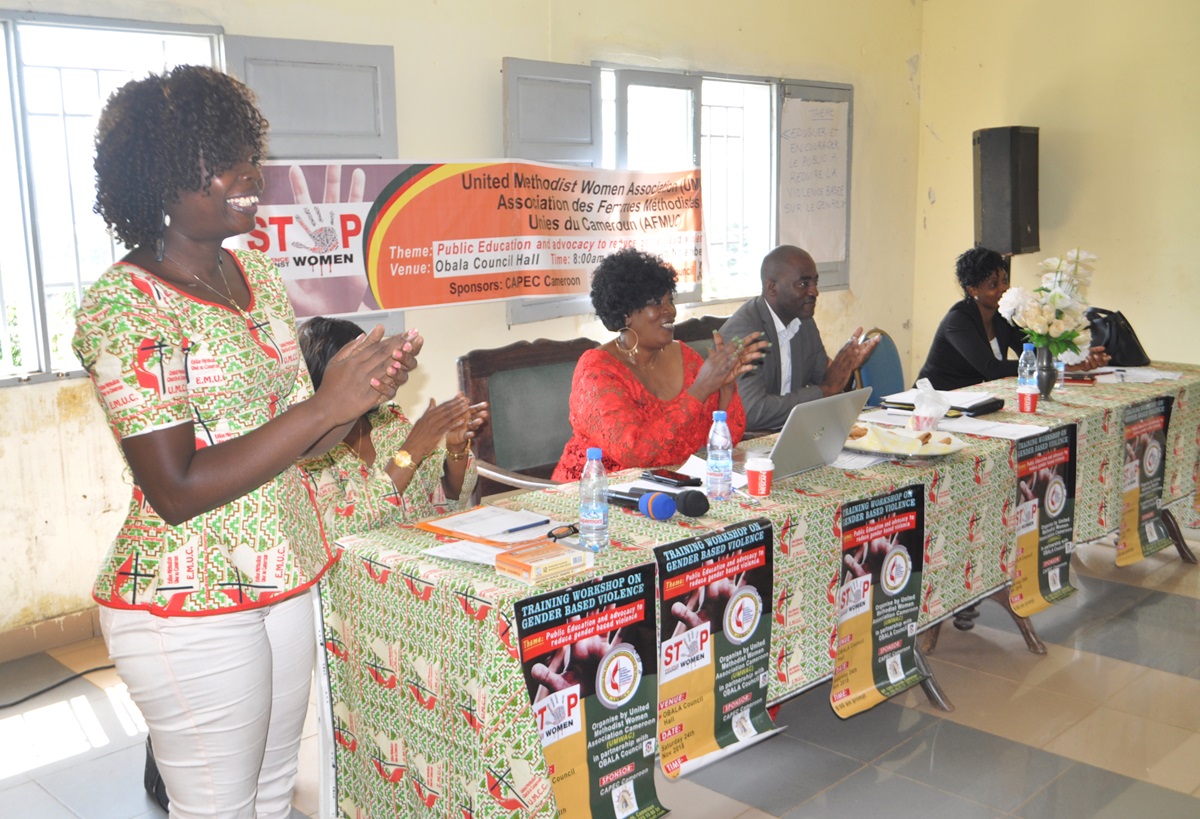Addressing gender-based violence in a patriarchal society, 55 Cameroonian women gathered recently to learn more about the issue and discover ways they can combat it.
The United Methodist Women Association Cameroon coordinated the event in partnership with two nonprofits, the Cameroon Association for the Protection and Education of the Child and the Obala Municipal Council.
Participants represented civic organizations and Christian denominations. They included indigenous, minority, HIV-infected and economically disadvantaged women, as well as victims of gender-based violence and runaway child brides seeking shelter and protection.
The workshop focused on equipping and empowering women with knowledge and awareness about legal and human rights to reduce their vulnerability to violence and discrimination. Participants learned about abuse-prevention guidelines to include in community-development action plans.
“I was in an abusive relationship for 10 years, hoping and praying my boyfriend would marry me,” recalled participant Asta Walolo Elveria. “I was coping with insult and frequent reminders of how worthless I am. I was always beaten and had no means to take care of my daughter.”
When her boyfriend traveled, she earned money through the sex trade.
Women in Cameroon have little decision-making and bargaining power in relationships. Even with improved perception of women, resulting in greater respect for their rights, society still primarily considers women a family asset.
The civil code designates the husband as head of the family and the principal moral and financial manager. Women are not entitled fully to use, enjoy or sell their property, although this right is stipulated in the country’s Constitution. The civil code grants the husband the right to administer communal property. He can sell or mortgage the couple’s property without the wife’s consent. The husband also manages his wife’s personal property and exercises all rights to it.

Women representing diverse experiences and roles attend a workshop to raise awareness about violence and discrimination in Cameroon. Photo by Collette Ndobe.
At the workshop, Tilder Kumichi Ndichia, gender expert and member of the independent National Commission on Human Rights and Freedoms, Cameroon, introduced gender concepts, citing family situations that often lead to violence.
She encouraged the women to defend their rights and to engage in different activities, proving they have a role in society and knowing they have worth and dignity. She advised them to learn new skills to gain independence from their husbands for basic necessities.
Ango Guillaume, subdivisional delegate for women’s empowerment and the family in Obala, said that of 100 cases, more than 70 complaints are reports by women of gender-based violence. This is especially common, he said, during the cocoa season, when men have extra money.
Guillaume explained aspects of the Cameroonian legislation and penal code regarding violence toward women. The women expressed concern that the laws are not enforced. Guillaume said the government opposes anyone who violates women’s rights.
Participant Fomen Maria Celine said, “I wish UMWAC can replicate this training workshop to other villages; a lot of rural women are ignorant and are suffering. They don’t know which government’s ministerial department they can go to complain.”
The Rev. Ning Melvis Abah, a United Methodist pastor, discussed domestic violence from a biblical perspective. She divided her presentation into three parts: what violence is all about, manifestation of violence and measures to avoid violence.
She cited cases of domestic violence against women in the Bible. Defining physical, psychological and spiritual violence, she said the latter is a means of imposing spiritual values on women using Scriptural quotations against them. She used the biblical story of Abigail and Nabal (1 Samuel 25) as an example.
The Rev. Mengada Ignace, a United Methodist pastor in Obala, said the church’s role is to teach, assist and engage both victims and perpetrators.
“Our core values as a church — to do good, do no harm and stay in love with God — must be a lived reality in our everyday life.”
Ndobe is a communicator for the United Methodist Women Association Cameroon.
News media contact: Vicki Brown, news editor, newsdesk@umcom.org or 615-742-5469. To read more United Methodist news, subscribe to the free Daily or Weekly Digests.
Like what you're reading? Support the ministry of UM News! Your support ensures the latest denominational news, dynamic stories and informative articles will continue to connect our global community. Make a tax-deductible donation at ResourceUMC.org/GiveUMCom.




